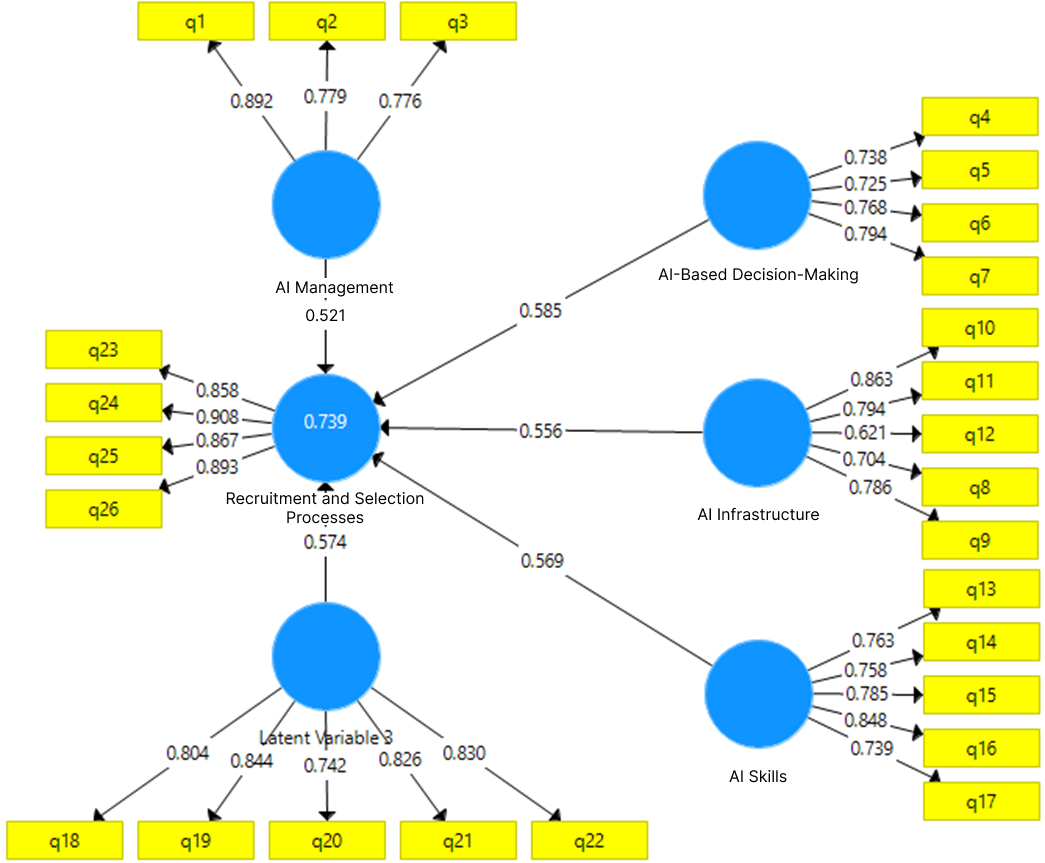The Role of Artificial Intelligence in Improving Recruitment and Selection Processes in Public Sector Organizations
Keywords:
Artificial Intelligence, Human Resource Management, Recruitment and SelectionAbstract
The present study aimed to examine the role of artificial intelligence (AI) in improving recruitment and selection processes in public sector organizations. This research is quantitative and descriptive-correlational in nature. The goal of such research is to investigate the relationships and correlations between the independent variable (artificial intelligence) and the dependent variable (improvement of recruitment and selection processes). The statistical population of this study consisted of all human resource employees and managers in public sector organizations in Tehran. Considering the use of the minimum sample size required for structural equation modeling, 256 respondents were included in the sample, and questionnaires were distributed among them. Six questionnaires were excluded due to incomplete responses, and statistical analyses were conducted on the remaining 250 respondents, who were selected using a multi-stage cluster sampling method. To collect data, both library and field research methods were employed, using a standardized questionnaire as the data collection tool. To assess the validity of the questionnaire, face validity, content validity, and construct validity were employed. Furthermore, reliability was measured using Cronbach's alpha coefficient, composite reliability, and McDonald's omega. Descriptive and inferential statistical methods were used in this study. In the inferential statistics section, structural equation modeling was employed using SmartPLS V3 software (2016). The findings indicated that artificial intelligence and its components (AI management, AI-based decision-making, AI infrastructure, AI skills, and AI adoption propensity) had a significant and positive effect on improving recruitment and selection processes in public sector organizations.
References
T. H. Davenport, A. Guha, D. Grewal, and T. Bressgott, "How Artificial Intelligence Will Change the Future of Marketing," Journal of the Academy of Marketing Science, vol. 48, no. 1, pp. 24-42, 2020, doi: 10.1007/s11747-019-00696-0.
M. Hajian and A. Hajian, "Development and Improvement of Human Resource Performance Using Artificial Intelligence in Organizational Processes," in Second National Conference on Digital Transformation and Intelligent Systems, Larestan, 2024.
A. Akbari and Tahmasebi, "Identifying the Applications and Requirements of Artificial Intelligence in the Recruitment and Hiring Process," Scientific Journal, vol. 21, no. 1, pp. 75-88, 2023.
Z. Chen, "Ethics and discrimination in artificial intelligence-enabled recruitment practices," Humanities and Social Sciences Communications, vol. 10, no. 1, pp. 1-12, 2023. [Online]. Available: https://doi.org/10.1057/s41599-023-02079-x.
P. O. Odili, "The Impact of Artificial Intelligence on Recruitment and Selection Processes in the Oil and Gas Industry: A Review," Engineering Science & Technology Journal, vol. 5, no. 2, pp. 612-638, 2024, doi: 10.51594/estj.v5i2.836.
O. Ore and M. Sposato, "Opportunities and Risks of Artificial Intelligence in Recruitment and Selection," International Journal of Organizational Analysis, 2021, doi: 10.1108/ijoa-07-2020-2291.
J. E. Bessen, "AI and Jobs: The Role of Demand," NBER Working Paper No. 24235, 2020.
P. Tambe, "Artificial Intelligence and the Future of Work," Harvard Business Review, vol. 98, no. 2, pp. 62-71, 2020.
R. Binns, "Fairness in Machine Learning: Lessons from Political Philosophy," in Proceedings of the 2020 Conference on Fairness, Accountability, and Transparency, 2020, pp. 149-158.
M. J. Culnan and R. J. Bies, "Managing Privacy: The Challenges of Information Technology," Business Horizons, vol. 63, no. 1, pp. 1-10, 2020.
C. O'Neil, Weapons of Math Destruction: How Big Data Increases Inequality and Threatens Democracy. Crown Publishing Group, 2021.
E. H. Schein, Organizational Culture and Leadership. Jossey-Bass, 2020.
S. Barocas and A. D. Selbst, "Big data's disparate impact," California Law Review, vol. 104, no. 3, pp. 671-732, 2020.

Downloads
Published
Submitted
Revised
Accepted
Issue
Section
License
Copyright (c) 2025 Management Strategies and Engineering Sciences

This work is licensed under a Creative Commons Attribution-NonCommercial 4.0 International License.











